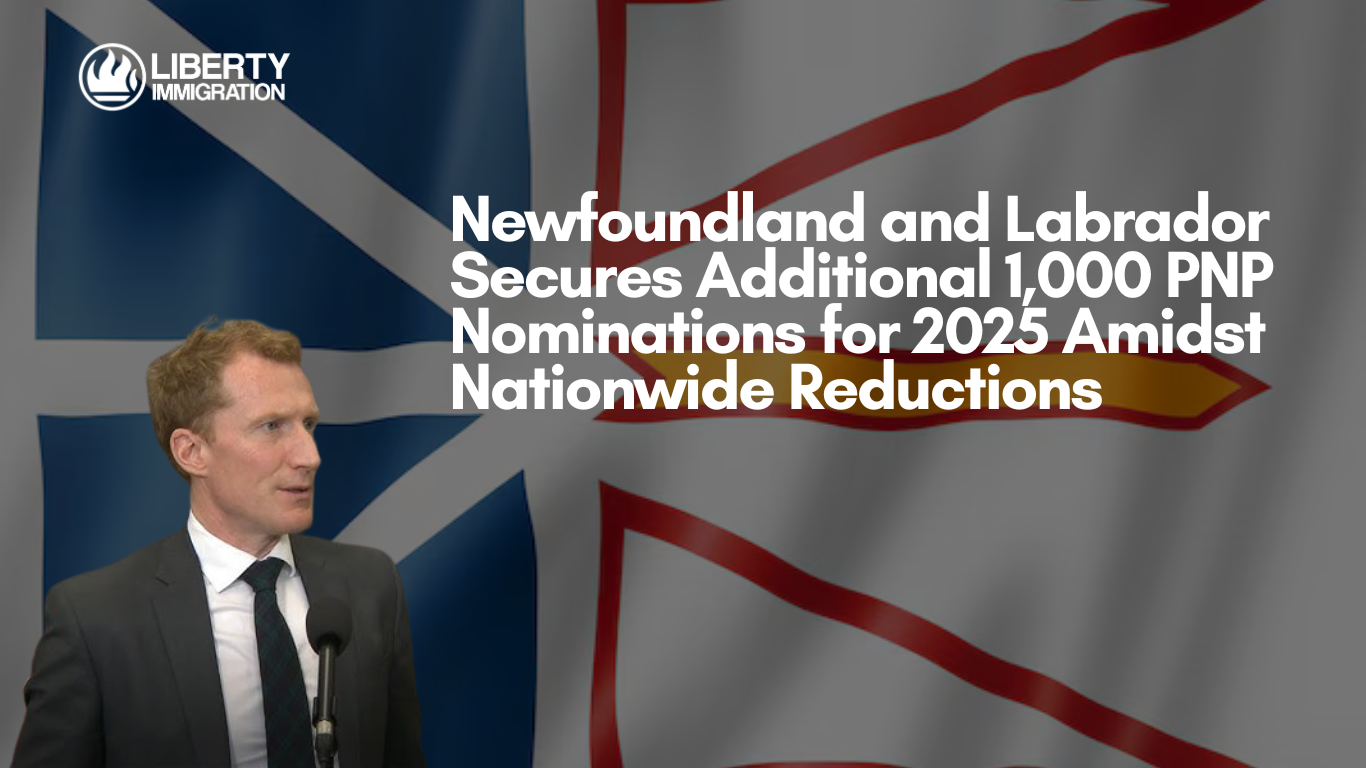Newfoundland and Labrador Secures Additional 1,000 PNP Nominations for 2025 Amidst Nationwide Reductions

Newfoundland and Labrador has successfully negotiated an increase of 1,000 spots for its 2025 Provincial Nominee Program (PNP), mitigating the impact of the federal government’s 50% cut to PNP allocations across provinces. This brings the total number of nominations for Newfoundland and Labrador to 2,050 for 2025.
Additionally, the province’s allocation under the Atlantic Immigration Program (AIP) remains unchanged at 475 spots, bringing its overall nomination total to 2,525 for 2025. This development follows extensive negotiations between the provincial and federal governments to ensure continued economic growth through immigration.
Temporary Pause on NLPNP Application Intake
To accommodate these changes and streamline processing, the Newfoundland and Labrador Provincial Nominee Program (NLPNP) has temporarily paused the intake of new applications until mid-February 2025.
During this period, the 25-day processing standard for applications has also been suspended. However, applications for healthcare workers and other high-demand occupations will continue to be processed on a priority basis.
The provincial government has stated that this pause will allow time to implement new digital tools and policy adjustments aimed at improving the efficiency of the immigration process and better aligning skilled newcomers with labor market needs in Newfoundland and Labrador.
How Did Newfoundland and Labrador Secure Additional Nominations?
Newfoundland and Labrador’s success in increasing its nomination allocation stems from a negotiated agreement with the federal government, in which the province committed to welcoming more humanitarian migrants in exchange for additional PNP nominations.
Key Details of the Agreement:
- Newfoundland and Labrador will accept 290 humanitarian migrants over the next two years.
- The federal government will cover all associated costs, including housing and settlement support.
- These migrants will include individuals affected by conflicts and crises, such as those from Ukraine, Sudan, and Hong Kong.
This agreement highlights the federal government’s shift toward prioritizing humanitarian immigration, with similar offers being extended to other provinces in exchange for increased PNP allocations.
Will Other Provinces Receive Additional Allocations?
As of now, it remains uncertain whether other provinces will be able to negotiate similar deals to recover lost nomination spots. However, Immigration Minister Marc Miller has indicated that provinces willing to increase their intake of asylum seekers will have the opportunity to regain some of their lost PNP allocations.
Miller recently stated on social media,
“Provinces and Territories that are willing to work in a responsible manner… including playing a role in taking on asylum seekers will have an opportunity to regain coveted Provincial Nominee spots.”
This suggests that provinces such as Ontario, Alberta, and Saskatchewan—which have strongly opposed the cuts—may have the option to restore part of their allocations by agreeing to support more humanitarian migrants.
How Do Newfoundland and Labrador’s 2025 Allocations Compare to Other Provinces?
While Newfoundland and Labrador successfully mitigated its allocation cut, other provinces continue to face drastic reductions.
| Province/Territory | 2025 Allocation | 2024 Allocation | Reduction (%) |
|---|---|---|---|
| Alberta | 4,875 | 9,750 | -50% |
| British Columbia | 4,000 | 8,000 | -50% |
| Manitoba | 4,750 | 9,540 | -50.2% |
| New Brunswick | 2,750 | 5,500 | -50% |
| Northwest Territories | 150 | 300 | -50% |
| Saskatchewan | 3,625 | 8,000 | -54.7% |
| Yukon | 215 | 430 | -50% |
The table highlights the nationwide impact of IRCC’s decision to reduce PNP landings by 50% in 2025, affecting provinces’ ability to nominate skilled workers for permanent residency.
Why Did the Federal Government Reduce PNP Allocations?
In October 2024, Immigration, Refugees, and Citizenship Canada (IRCC) announced a significant cut in its 2025-2027 Immigration Levels Plan, citing concerns over affordability, housing shortages, and strain on public services.
- The original target for PNP landings in 2025 was 120,000, which was cut to 55,000—a 50% reduction.
- These reduced levels are set to remain unchanged for 2026 as well.
Minister Marc Miller defended the move, stating,
“We are committed to managing immigration levels in a way that supports Canada’s economic needs while ensuring sustainability and responsible growth.”
Despite pushback from multiple provinces, the federal government has maintained its stance, signaling a more cautious approach to immigration growth in the coming years.
Final Thoughts
Newfoundland and Labrador’s successful negotiation for additional nominations sets an important precedent for other provinces looking to regain lost allocations. By agreeing to accept more humanitarian migrants, the province was able to restore a significant portion of its PNP spots, highlighting the new conditions under which provinces must negotiate with IRCC.
As the PNP reductions take effect, other provinces will need to decide whether to accept humanitarian immigrants in exchange for increased economic immigration spots.
With provincial immigration ministers voicing strong opposition to the cuts, the debate over PNP allocations in 2025 is far from over. The coming months will determine whether more provinces follow Newfoundland and Labrador’s example or continue to push for a reversal of the reductions.



